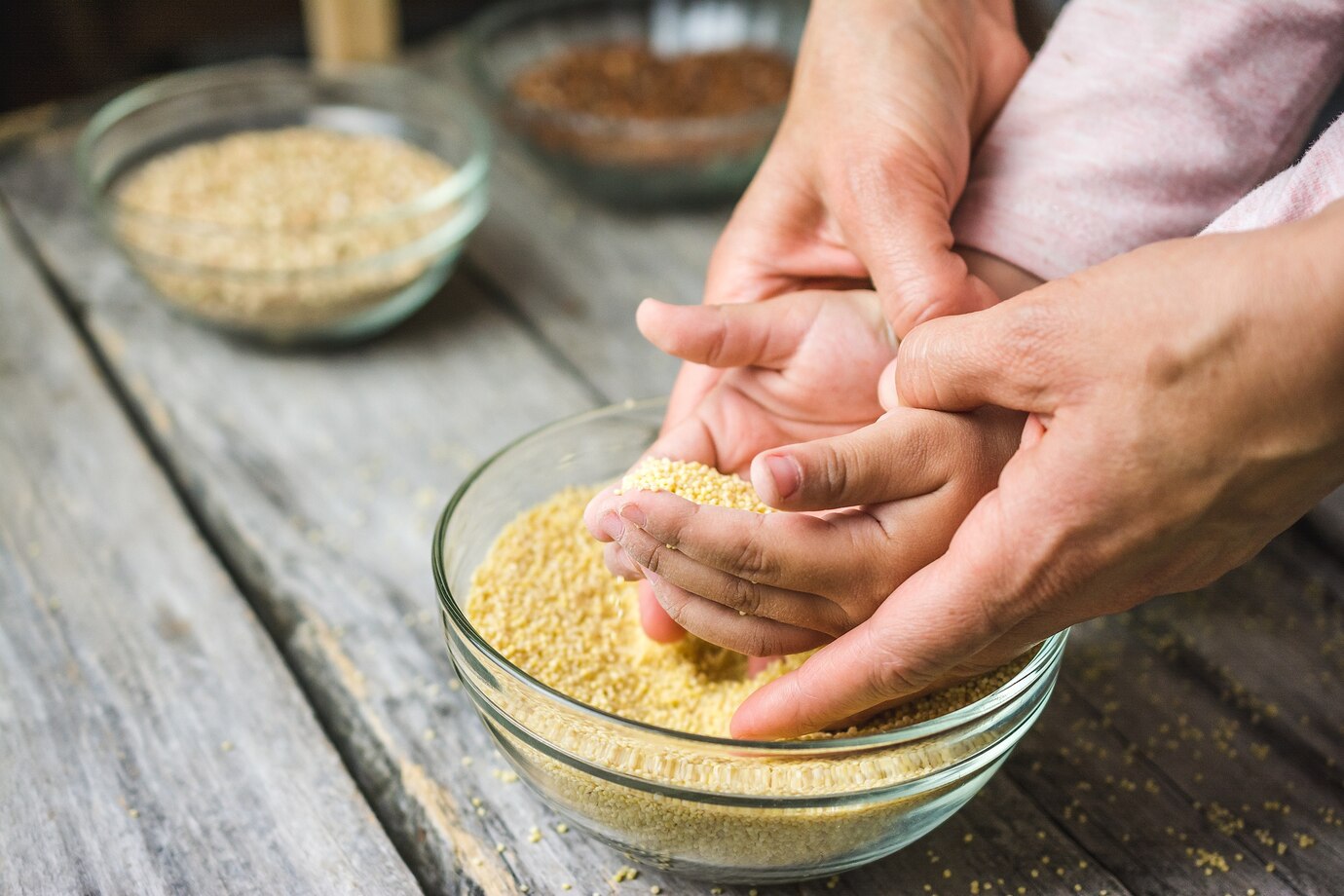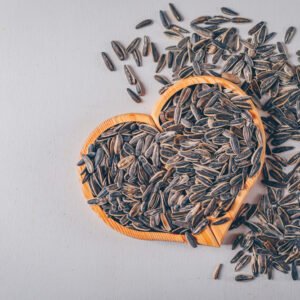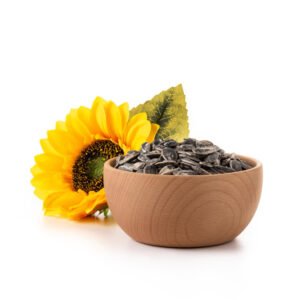Introduction to Finger Millet and Pregnancy
Pregnancy is a transformative journey requiring optimal nutrition to support both the mother and the developing baby. Finger millet, commonly known as ragi, is a nutrient-dense, gluten-free grain that stands out as a superfood for pregnant women. At CMS Industries, a leading supplier of high-quality grains and agricultural products, we champion ragi for its exceptional health benefits and sustainability. With the global superfood market projected to reach $250 billion by 2028, ragi’s role in prenatal nutrition is gaining traction.
This blog explores the advantages of having finger millet during pregnancy, detailing its nutritional benefits, impact on maternal and fetal health, and practical ways to include it in a pregnancy diet. Discover why CMS Industries’ premium ragi is a trusted choice for expecting mothers.
What Is Finger Millet (Ragi)?
Finger millet (Eleusine coracana) is a small, reddish-brown grain primarily grown in India, Africa, and Asia. Named for its finger-like seed heads, ragi is rich in calcium, iron, fiber, protein, and antioxidants, making it a nutritional powerhouse. Its gluten-free nature, low glycemic index (GI), and high nutrient density make it ideal for pregnancy, supporting bone health, energy levels, and fetal development. Ragi is versatile, used in porridges, rotis, dosas, and health drinks, offering a nutty flavor.
CMS Industries sources finger millets from trusted Indian farmers, ensuring purity and quality through rigorous testing. Our commitment to sustainable agriculture makes our ragi a top choice for prenatal nutrition.
Why Finger Millet for Pregnancy?
Pregnancy demands increased nutrients to support maternal health, fetal growth, and recovery post-delivery. Ragi excels due to its:
- High Calcium: Supports bone development for mother and baby.
- Rich Iron: Prevents anemia, common in pregnancy.
- Low GI: Stabilizes blood sugar, reducing gestational diabetes risk.
- Fiber Content: Promotes digestion, addressing pregnancy-related constipation.
- Sustainability: Eco-friendly cultivation ensures affordable, accessible nutrition.
CMS Industries’ ragi, processed to retain maximum nutrients, delivers these benefits, making it a vital addition to pregnancy diets.
Advantages of Having Finger Millet During Pregnancy
Ragi’s nutritional profile offers numerous benefits for expecting mothers. Below are the top 10 advantages of incorporating finger millet into a pregnancy diet, supported by science and practical insights:
- High Calcium for Fetal Bone Development
Ragi contains 344mg of calcium per 100g, essential for fetal bone and teeth formation. It also supports maternal bone health, reducing the risk of osteoporosis during and after pregnancy.
How It Helps: CMS Industries’ ragi strengthens bones for mother and baby.
- Rich Iron to Prevent Anemia
Pregnancy increases iron needs to support blood volume expansion. Ragi’s 3.9mg of iron per 100g boosts hemoglobin, preventing anemia and reducing fatigue, a common pregnancy concern.
How It Helps: CMS Industries’ ragi combats anemia with iron-rich grains.
- Low Glycemic Index for Blood Sugar Control
Ragi’s GI of 50-55 ensures slow glucose release, stabilizing blood sugar and reducing the risk of gestational diabetes, which affects 2-10% of pregnancies.
How It Helps: CMS Industries’ ragi supports steady blood sugar levels.
- High Fiber for Digestive Health
Ragi’s 3.6g of fiber per 100g promotes regular bowel movements, alleviating pregnancy-related constipation. It also supports gut health, enhancing nutrient absorption for mother and baby.
How It Helps: CMS Industries’ ragi improves digestion with fiber-rich grains.
- Protein for Tissue Growth
Ragi provides 7-8g of protein per 100g, supporting fetal tissue development, placental growth, and maternal muscle health. Its amino acids, like methionine, aid cell repair.
How It Helps: CMS Industries’ ragi fosters growth with protein-packed grains.
- Antioxidants for Maternal Immunity
Ragi’s polyphenols and ferulic acid reduce oxidative stress, boosting maternal immunity. This helps protect against infections, ensuring a healthier pregnancy.
How It Helps: CMS Industries’ ragi enhances immunity with antioxidant-rich grains.
- Folate for Neural Tube Development
Ragi contains folate, crucial for preventing neural tube defects in the fetus. Adequate folate intake in early pregnancy supports brain and spinal cord development.
How It Helps: CMS Industries’ ragi supports fetal neural health with folate.
- Energy Boost for Maternal Vitality
Ragi’s complex carbohydrates and B vitamins provide sustained energy, combating pregnancy fatigue. Its iron content ensures efficient oxygen transport, enhancing stamina.
How It Helps: CMS Industries’ ragi fuels energy for expecting mothers.
- Gluten-Free for Sensitive Diets
Ragi is naturally gluten-free, safe for pregnant women with celiac disease or gluten intolerance, ensuring nutrient intake without digestive discomfort.
How It Helps: CMS Industries’ ragi supports gluten-free prenatal diets.
- Sustainable and Affordable Nutrition
Ragi’s drought-resistant cultivation makes it affordable and accessible, ideal for pregnant women in diverse economic settings. Its eco-friendly nature aligns with sustainable diets.
How It Helps: CMS Industries’ ragi offers budget-friendly, sustainable nutrition.
How Finger Millet Supports Pregnancy: The Science
Scientific research validates ragi’s benefits for pregnancy:
- A 2020 study in Journal of Food Science and Technology highlights ragi’s high calcium bioavailability, surpassing other grains, ideal for fetal bone development.
- A 2018 study in Food Chemistry notes ragi’s polyphenols improve insulin sensitivity, reducing gestational diabetes risk.
- Research in Nutrients (2019) confirms ragi’s iron and folate support maternal blood health and fetal neural development.
CMS Industries’ ragi aligns with these findings, offering a scientifically backed superfood for pregnancy.
How to Incorporate Ragi into a Pregnancy Diet
Ragi’s versatility makes it easy to include in pregnancy-friendly meals. Here are practical ways to enjoy it:
- Ragi Porridge: Cook ragi flour with milk or water, sweetened with jaggery or fruit, for a calcium-rich breakfast.
- Ragi Roti: Mix ragi flour with water for gluten-free flatbreads, paired with leafy greens or lentils.
- Ragi Dosa: Blend ragi with urad dal for nutrient-packed dosas, served with low-sugar chutney.
- Ragi Malt: Prepare a health drink with ragi flour and water, ideal for hydration and energy.
- Ragi Cookies: Bake with ragi flour and natural sweeteners for a pregnancy-safe snack.
Pro Tip: CMS Industries’ Premium Ragi Flour is finely milled and nutrient-rich, ensuring easy preparation and maximum benefits for pregnant women.
Why Choose CMS Industries for Finger Millet?
As a trusted supplier, CMS Industries delivers quality and sustainability:
- Premium Quality: Our ragi is sourced from trusted farmers and tested for purity and nutrient content.
- Sustainable Sourcing: We support eco-friendly farming, minimizing environmental impact.
- Global Reach: Our efficient supply chain delivers fresh ragi worldwide.
- Customized Solutions: We offer whole ragi, flour, and processed products for prenatal needs.
- Expert Support: Our team provides recipes and guidance for pregnancy-friendly ragi use.
Visit CMS Industries to explore our ragi offerings and request samples for your pregnancy diet.
Ragi’s Role in a Holistic Pregnancy Diet
Pregnancy nutrition requires a balance of macronutrients, micronutrients, and hydration. Ragi supports this holistic approach:
- Macronutrients: Fiber and protein aid digestion and tissue growth.
- Micronutrients: Calcium, iron, and folate support bone, blood, and neural health.
- Hydration: Ragi malt or soups contribute to fluid intake, crucial during pregnancy.
CMS Industries’ ragi integrates seamlessly into prenatal diets, offering a nutrient-dense, sustainable solution.
Potential Side Effects and Precautions for Pregnant Women
Ragi is generally safe during pregnancy, but consider these precautions:
- Moderation: High fiber may cause bloating; start with 50-100g daily.
- Oxalates: High oxalate content may affect kidney stone patients; consult a doctor.
- Allergies: Rare, but test for sensitivity if new to ragi.
- Balanced Diet: Pair with vegetables, proteins, and fruits for complete nutrition.
CMS Industries provides preparation guidelines to ensure safe, effective ragi consumption for pregnant women.
Tips for Maximizing Ragi’s Benefits During Pregnancy
To optimize ragi’s benefits, follow these expert tips:
- Pair with Vitamin C: Combine with citrus or vegetables to enhance iron absorption.
- Soak Before Cooking: Soaking improves digestibility and nutrient bioavailability.
- Avoid Sugary Additives: Use natural sweeteners like jaggery in moderation.
- Monitor Portions: Stick to 1-2 rotis or ½ cup porridge daily to balance nutrients.
- Choose Quality: Select CMS Industries’ ragi for purity and nutrient retention.
Ragi vs. Other Grains for Pregnancy
Compared to other grains, ragi excels for pregnancy:
- Vs. Wheat: Ragi is gluten-free and higher in calcium and iron.
- Vs. Rice: Ragi’s lower GI and higher fiber surpass white rice.
- Vs. Oats: Ragi offers more calcium and folate for fetal development.
CMS Industries’ ragi provides a superior choice for prenatal nutrition, balancing health and sustainability.
The Future of Finger Millet in Prenatal Nutrition
Ragi is gaining global recognition in pregnancy diets:
- Functional Foods: Incorporated into prenatal snacks, baby foods, and health drinks.
- Global Awareness: Rising in gluten-free and nutrient-dense diets.
- Research Advances: Studies validate ragi’s role in maternal and fetal health.
- Sustainable Nutrition: Aligns with eco-friendly eating trends.
CMS Industries promotes ragi through sustainable sourcing and innovative products, ensuring its place in prenatal care.
Conclusion
Finger millet, or ragi, is a superfood powerhouse for pregnancy, offering advantages like calcium for bone health, iron for anemia prevention, and a low GI for blood sugar control. Its nutrient density and sustainability make it a prenatal essential. CMS Industries’ premium ragi, sourced sustainably, is your trusted choice for a healthy pregnancy. Visit CMS Industries to explore our ragi products and nourish your pregnancy journey.
Frequently Asked Questions (FAQs)
- Why is finger millet beneficial during pregnancy?
Ragi’s high calcium, iron, and fiber support fetal bone development, prevent anemia, and aid digestion. CMS Industries’ ragi ensures nutrient-rich, gluten-free nutrition for a healthy pregnancy.
- How does ragi help prevent anemia in pregnancy?
Ragi’s iron (3.9mg/100g) boosts hemoglobin, reducing anemia risk. CMS Industries’ ragi provides iron-rich grains, enhancing energy and blood health for expecting mothers.
- Can ragi reduce gestational diabetes risk?
Yes, ragi’s low GI (50-55) stabilizes blood sugar, lowering gestational diabetes risk. CMS Industries’ ragi supports steady glucose levels with fiber-rich, nutrient-dense grains.
- Why choose CMS Industries for ragi during pregnancy?
CMS Industries offers sustainably sourced, high-quality ragi, tested for purity. Our nutrient-rich grains support prenatal health, trusted globally for excellence and eco-friendly nutrition.
- What ragi recipes are safe for pregnant women?
Ragi porridge, rotis, and dosas with low-sugar ingredients are ideal. CMS Industries’ ragi flour inspires pregnancy-friendly recipes, adding calcium and iron to balanced meals.





